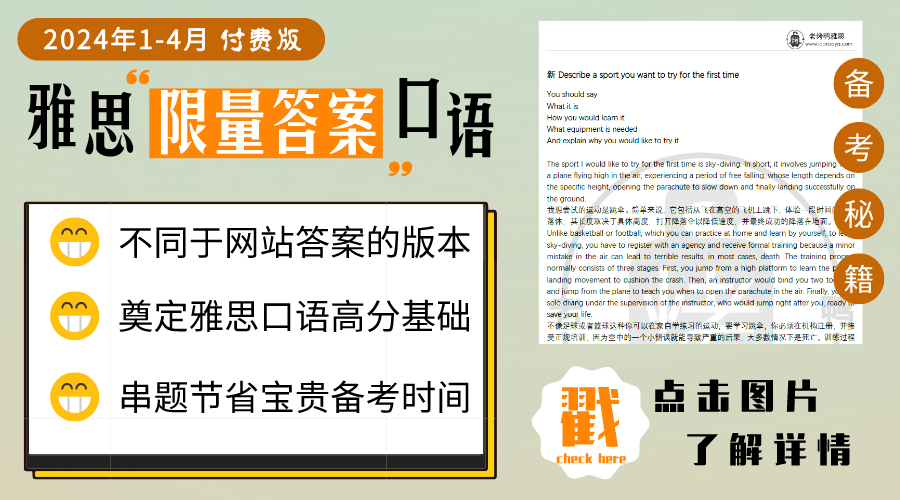剑桥雅思8Test2Section4听力原文与答案 Research on questions about doctors
剑桥雅思8听力第二套题目第四部分的主题为人们对于医生所存在的问题的调查。内容包括:作者在成立研究项目时所取得的帮助,研究所包含的人群类别,设计调查问卷的目的,最初的研究结果,未来需要进一步研究的方向,从中所学到的东西,以及对调查对象的吐槽等。
点击查看这篇雅思听力中需要大家掌握的重点词汇与具体题目的答案解析:
雅思备考听力篇 剑8 test 2 section 4 雅思听力高频词汇
剑桥雅思8Test2听力Section4答案解析 Research on questions about doctors
剑8 test 2 Section 4雅思听力原文
I’ve been doing some research into what people in Britain think of doctors, the ones who work in general practice – the first call for medical care – and comparing this with the situation in a couple of other countries. I want to talk about the rationale behind what I decided to do.
Now I had to set up my programme of research in three different countries so I approached postgraduates in my field in overseas departments (Q31), contacting them by email, to organise things for me at their end. I thought I would have trouble recruiting help but in fact everyone was very willing and sometimes their tutors got involved too.
I had to give my helpers clear instructions about what kind of sample population I wanted them to use. I decided that people under 18 should be excluded because most of them are students or looking for their first job, and also I decided at this stage just to focus on men who were in employment (Q32), and set up something for people who didn’t have jobs and for employed women later on as a separate investigation.
I specifically wanted to do a questionnaire, and interviews with a focus group. With the questionnaire, rather than limiting it to one specific point, I wanted to include as much variety as possible (Q33). I know questionnaires are a very controlled way to do things but I thought I could do taped interviews later on to counteract the effects of this. And the focus group may also prove useful in future, by targeting subjects I can easily return to, as the participants tend to be more involved.
So I’m just collating the results now. At the moment it looks as if, in the UK, despite the fact that newspapers continually report that people are unhappy with medical care, in fact it is mainly the third level of care, which takes place in hospitals, that they are worried about (Q34). Government reforms have been proposed at all levels and although their success is not guaranteed, long-term hospital care is in fact probably less of an issue than the media would have us believe. However, I’ve still got quite a bit of data to look at.
Certainly, I will need to do more far-reaching research than I had anticipated in order to establish if people want extra medical staff invested in the community, or if they want care to revert to fewer but larger, key medical units (Q35). The solution may well be something that can be easily implemented by those responsible in local government, with central government support of course.
This first stage has proved very valuable though. I was surprised by how willing most of the subjects were to get involved in the project – I had expected some unwillingness to answer questions honestly. But I was taken aback and rather concerned that something I thought I’d set up very well didn’t necessarily seem that way to everyone in my own department (Q36).
I thought you might also be interested in some of the problems I encountered in collecting my data. There were odd cases that threw me – one of the subjects who I had approached while he was out shopping in town, decided to pull out when it came to the second round (Q37). It was a shame as it was someone who I would like to have interviewed more closely. And one of the first-year students I interviewed wanted reassurance that no names would be traceable from the answers (Q38). I was so surprised, because they think nothing of telling you about themselves and their opinions in seminar groups!
Then, one of the people that I work with got a bit funny. The questions were quite personal and one minute he said he’d do it, then the next day he wouldn’t, and in the end he did do it (Q39). It’s hard not to get angry in that situation but I tried to keep focused on the overall picture in order to stay calm.
The most bizarre case was a telephone interview I did with a teacher at a university in France. He answered all my questions in great detail – but then when I asked how much access he had to dangerous substances he wouldn’t tell me exactly what his work involved (Q40). It’s a real eye-opener. . .
剑8 test 2 Section 4雅思听力答案
31. B
32. B
33. A
34. A
35. C
36. C
37. B
38. F
39. D
40. C


